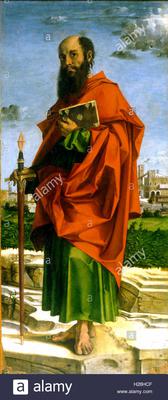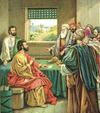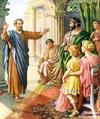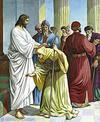Paul's Defense Part 3 of 4
by John Lowe
(Woodruff, S.C.)

The designation “Lord” would not at first have had the significance that it later had for the apostle, but he now fell into the Christian use of the title in his narration: “the Lord said . . .” Jesus was not, of course, Lord to this Jewish crowd. Jesus’ reply is essentially the same as in 9:6. Up to this point in his speech, Paul had identified closely with his Jewish listeners. In every way, he had shown himself to be as Jewish as they were. Now he began to draw the line that differentiated him from them.
11 And when I could not see for the glory of that light, being led by the hand of them that were with me, I came into Damascus.
That the light was divine in its origin is confirmed by the phrase “the Glory of that light” (NIV “the brilliance of the light”). The reference is to the Shekinah—the Glory of God manifested to human beings: “And he said, Men, brethren, and fathers, hearken; The God of glory appeared unto our father Abraham . . .” This verse explicitly attributes Paul’s blindness to this cause (“the glory of that light”; the glory of God), which comes from his own recollections, but in 9:8 it is simply stated that he is blind. His companions, on the other hand, seem not to have been affected. They lead him “by the hand . . . into Damascus,” and there he was left—left with time to think, time to pray, time to reevaluate his whole life and the tragic mistake he had made in persecuting Jesus and His followers.
12 And one Ananias, a devout man according to the law, having a good report of all the Jews which dwelt there,
The third part of the speech is about his commission. With Paul, conversion brought an immediate call to service; however, much of his mission remained to be clarified in the years ahead. The instrument of his calling was Ananias, to whose earlier description Paul now added that he was a “devout” observer of the law and highly respected by all the Jews living in Damascus. This was undoubtedly true of Ananias, but it served Paul’s purpose to show that such a man played a key role in his conversion—no law-breaker, but a man highly regarded for his piety. Paul wished to make the same point about Ananias he had been making about himself—that his Christian faith had not in any way detracted from his loyalty to Judaism. Notice that he did not mention that Ananias was also a Christian, not to this audience. But he described him as a Jew whose good name was beyond reproach. He was a Jew in touch with Jesus, a Jew not ashamed or afraid to call his bitterest enemy his brother (v. 13).
13 Came unto me, and stood, and said unto me, Brother Saul, receive thy sight. And the same hour I looked up upon him.
14 And he said, The God of our fathers hath chosen thee, that thou shouldest know his will, and see that Just One, and shouldest hear the voice of his mouth.
15 For thou shalt be his witness unto all men of what thou hast seen and heard.
The last thing Saul had seen was the face of the Christ. The next thing he saw was the face of a Christian. He had seen the Head; now he saw a member of the Body (v. 13). But Ananias, a Christian Jew from Damascus, had come to him—to him, the great persecutor of the church—and had called him “brother.” Moreover, he had produced a miracle. He had restored his sight. The abiding result of having seen Jesus would be that the image would remain in the mind’s eye. To have seen the risen Lord was an essential qualification of an apostle (1:22; 2:32; 3:15; 4:33; etc.).
But because the story was being told from Paul’s point of view, we hear nothing of Ananias’ vision and of the struggle he had had in bringing himself to go to Paul (9:10-16). As far as Paul was concerned, Ananias had simply appeared at the house on Straight Street with two things to say: first, a word of healing—“Brother Saul, receive your site!” (v. 13; 9:17); and second an announcement concerning his future work.
Paul, much more than Luke in the earlier narrative, retained the Jewish dialect of Ananias’ speech: “The God of our fathers” and “the voice of his mouth” (v. 14; 15:7b), to which may be added the archaic description of Jesus, as “that Just One” (3:14; 7:52; 11:20). The “Just One” is a Jewish messianic title, found earlier in the speeches of Peter and of Stephen to the Jews (3:14; 7:52). The same title was given to James the brother of Jesus, who was called James the Just (i.e., Righteous) because of his devotion to the Jewish law.
By recalling Ananias’ phrase “the God of our fathers,” Paul may have been hoping once again to show his oneness with his audience. But the verb he “has chosen” (v. 14), seems always to indicate a most pressing duty (Exodus 4:13; Joshua 3:12) and may be intended by Luke to express here what he knew to be Paul’s own consciousness of his high calling—“But the Lord said to Ananias, “Go! This man is my chosen instrument to proclaim my name to the Gentiles and their kings and to the people of Israel” (9:15). It indicates a choice and a calling made long before his response to it (Jeremiah 1:4). Out of consideration for his audience, Paul did not yet employ the word “Gentile” in stating to what precisely he had been called. He put it only in general terms—to be a “witness to all men of what” he had “seen and heard” (v. 15; v. 21; 9:15; 26:17; Galatians 1:16). As he had persecuted the Lord from heaven, so henceforth he must proclaim Him. He was to be a witness. A witness is not an attorney. The work of a “witness” is simply to testify what he has “seen and heard.” That was to be Paul’s life work. And he was to bear that witness “to all men”—not just to the Jews. Obviously, the Jewish crowd did not catch on that “all men” included the Gentiles. This became much more specific in Paul’s account of his temple vision (v. 21). At that point, the Jewish crowd got the message all too clearly (v. 22). Paul was leading up now to his great call to evangelize the Gentile world. He approached it cautiously, for he knew only too well the temper and prejudice of that crowd. He made clear that his commission was conveyed to him by a brother Jew, a devout Jew, a law-abiding Jew, a Jew who was respected by all other Jews in town. He labored the point because he hoped it would bridge the vast gulf of their bitter, narrow-minded religious prejudice and racial pride.
16 And now why tarriest thou? arise, and be baptized, and wash away thy sins, calling on the name of the Lord.
According to 9:17, Ananias had already announced the gift of the Holy Spirit to Paul. “And Ananias went his way, and entered into the house; and putting his hands on him said, Brother Saul, the Lord, even Jesus, that appeared unto thee in the way as thou camest, hath sent me, that thou mightest receive thy sight, and be filled with the Holy Ghost” (Acts 9:17, KJV). The phrase translated “why tarriest thou?” is a common Greek saying and implies that it was time Paul acted on this commission from the Lord. The first step obviously was to “be baptized” into the community of believers. “Be baptized, and wash away thy sins” could be taken as a proof text for baptismal regeneration. In the early church baptism was a symbolic and indispensable testimony of the conversion experience; however, it is faith in Jesus and not baptism that saves (Acts 16:31; Ephesians two 8-9).
The question in this verse runs parallel with that of Peter in 10:47—“Can any man forbid water, that these should not be baptized, which have received the Holy Ghost as well as we?”—and it follows the gift of the Spirit to Cornelius and his friends. The question is an abrupt one, sounding almost like a rebuke. It demanded a clearer response. The faith that is the prerequisite of forgiveness and of baptism is applied in the phrase, “calling on the name of the Lord,”the professions of faith in Christ that is the basis for the act of baptism.
“Baptism” would publicly identify him with the Lord and with His people, and “calling on the name of the Lord” would remove his guilt and sin. By this step, he would publicly and forever disassociate himself from the Jewish nation’s crime of crucifying the Christ of God. The requirement was similar to the one demanded of the convicted Jews on the day of Pentecost (2:37-38).
No content on preachology.com may be printed or
copied to any other site without permission.
|
The Preaching Ezine Subscribe to my free newsletter for monthly sermons and get a free book right now. Just follow the link above and get the details! |
|
Sermon Supply Ministry
Be ready for Sunday…before Saturday night! |
|
Manna Seminary
Did you ever want to start or finish your Ministry Training? |
|
YOUR PAGES: by sharing YOUR great sermons! by sharing YOUR great poems! |










